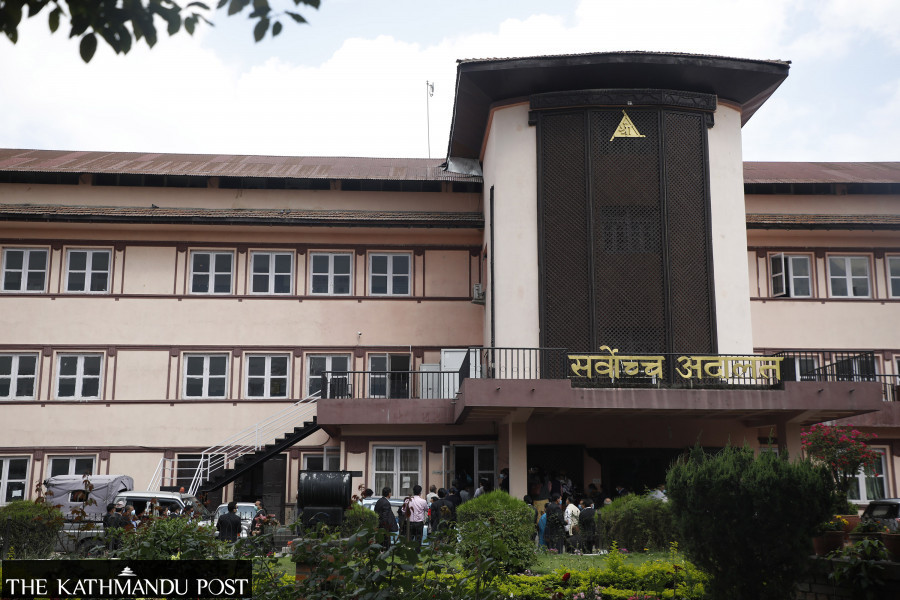Politics
Hearing on cases related to constitutional appointments in limbo
The Supreme Court has issued an interim order to first settle whether the Constitutional Bench can sit without the chief justice, who has recused himself from the hearing.
Tika R Pradhan
The hearing on the petitions challenging the appointments of office bearers to various constitutional bodies has been thrown into limbo after the Supreme Court’s interim order in response to a petition filed by advocate Ganesh Regmi.
After Chief Justice Cholendra Shumsher Rana recused himself from the Constitutional Bench that was supposed to adjudicate the appointments made by the Constitutional Council led by former prime minister KP Sharma Oli, the bench was recomposed under senior-most Justice Deepak Kumar Karki.
The hearing was scheduled for Friday.
But on the eve of the hearing, the Supreme Court granted the interim order in response to Regmi’s petition, where he had questioned the validity of the Constitutional Bench that excludes the chief justice.
“Since it is necessary to finalise whether the chief justice, who is a member of the Constitutional Council as per Article 284 of constitution, should be on the bench or not, an interim order has been issued not to hear those petitions [against constitutional appointments] until the issue is settled,” states the order issued by Justice Phuyal on Thursday.
On August 27, Chief Justice Rana decided to recuse himself from the case after questions were raised about his presence in the bench set up to hear the case where he had a conflict of interest.
As a member of the Constitutional Council that made the appointments, lawyers and petitioners had argued that Rana was a party to the case and unfit to pass a fair judgement.
Though Rana acquiesced and allowed senior-most justice Karki to preside over the five-member Constitutional Bench to hear the petitions, his departure has also raised questions about the validity of the bench.
Article 137(1) of the constitution states that theConstitutional Bench exists in the Supreme Court and that it shall consist of the chief justice and four other judges designated by the chief justice on the recommendation of the Judicial Council.
Following Thursday’s interim order, legal experts say the hearing on the constitutional appointments could be delayed by several weeks if not months.
Some legal experts have said the Supreme Court’s interim order was unusual.
“The order will certainly raise questions over the intention of the legal professionals,” said advocate Om Prakash Aryal, who is also one of the petitioners who have challenged the appointments.
Balaram KC, former Supreme Court justice, said: “I have seen the Supreme Court giving orders to bundle-up similar petitions, but for the first time in my life, I saw the court ordering not to hear certain petitions.”
“I also saw for the first time a writ petition being filed against the chief justice’s recusal from a certain case,” he added.
The interim order, legal experts say, has unnecessarily tangled the hearing on the controversial appointments.
“The intention of Thursday’s order in essence is to stop the possible quashing of the controversial constitutional appointments,” said Anup Raj Sharma, a former chief justice. “There could be a question of amending the constitution but the question at present is whether the chief justice has a right to recuse.”
The judges of any other court have the right to recuse themselves from a case if they have a conflict of interest. But the chief justice’s recusal has stirred a debate to the surprise of many.
“I don’t know how the issue of the chief justice taking leave became such a big issue,” said Prakash Osti, a former justice of the Supreme Court.
On Friday, senior advocate Dinesh Tripathi filed a petition to vacate Thursday's interim order, claiming that it came without the petitioners getting a chance to defend their case.
In his petition, Tripathi argues that the Constitutional Bench was the final interpreter of the laws and the constitution and it is an automatically proven fact that a single bench cannot order the Constitutional Bench to halt a hearing.
“Such an order would lead to judicial deviation,” Tripathi states in his petition. “There are some established facts—people knock the court’s door with cases of public concern to promote public welfare and the rule of law.”
As soon as the Constitutional Council recommended appointments to various constitutional bodies on December 15, senior advocate Tripathi and advocate Aryal filed the petitions demanding that the appointments based on the ordinance be scrapped.
The ordinance was issued so that a simple majority of the Constitutional Council could hold meetings and make decisions.
On February 5, Speaker Agni Prasad Sapkota, who is also a member of the Constitutional Council, had also filed a petition demanding that the appointments be revoked.
The ordinance was issued by the Oli government after the postponement of a council meeting due to Speaker Sapkota’s refusal to participate.
In his petition, Sapkota has named Chief Justice Rana as one of the defendants for being a member of the Constitutional Council that nominated the candidates.
On August 8, Rana issued a response to the Speaker’s petition, saying the appointments were made following the due legal process.
A former Supreme Court justice said Regmi’s petition was brought on behalf of the 52 appointees and former prime minister Oli and that they were displeased with Rana for recusing himself from the Constitutional Bench.
“Some officials of the Supreme Court have informed me that the former prime minister and the appointees, especially the ones at the anti-graft body, had put pressure on the chief justice after he decided to recuse,” said the former justice. “This has come in a planned and systematic manner to linger [the case]. Let’s see what happens next.”




 16.12°C Kathmandu
16.12°C Kathmandu














